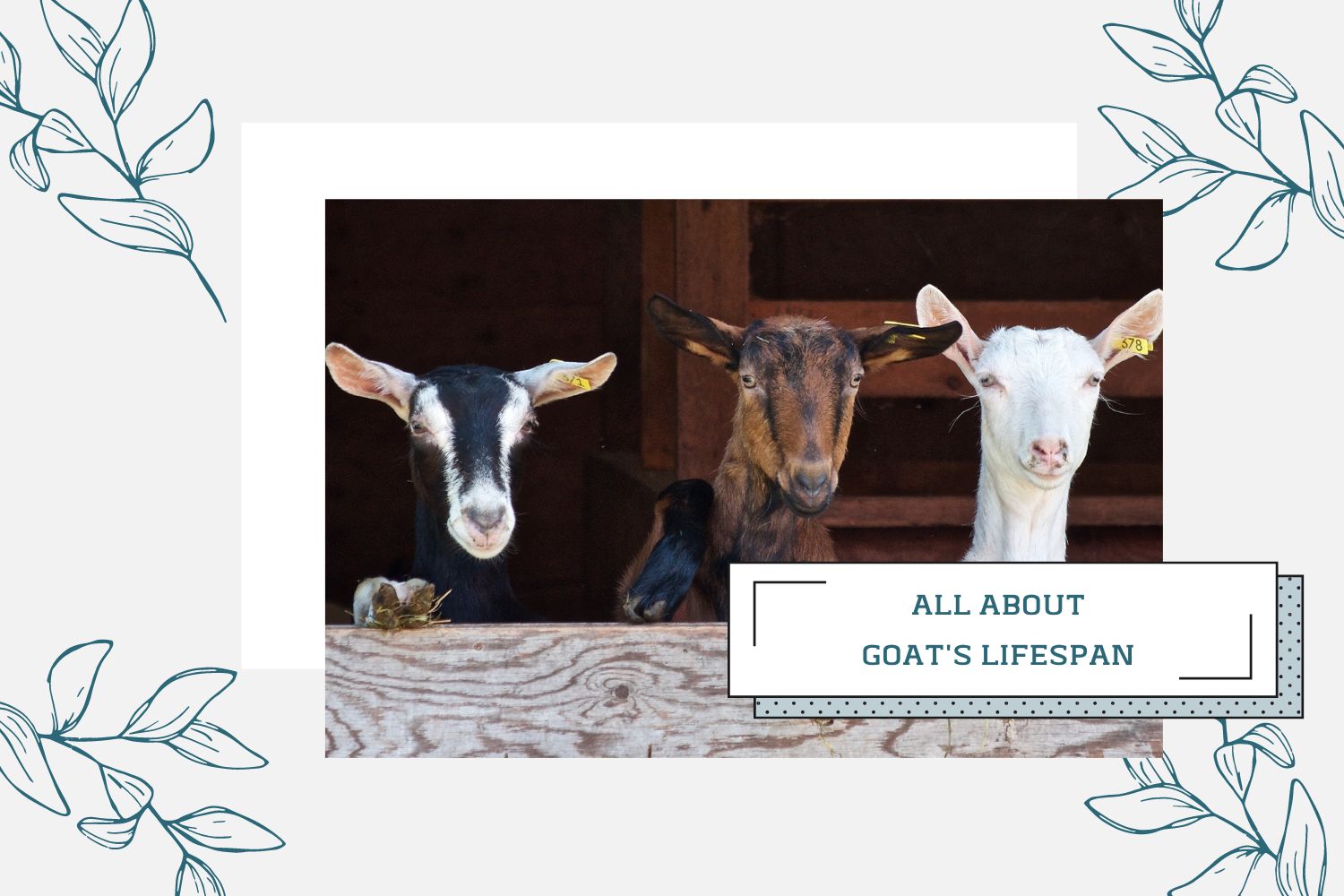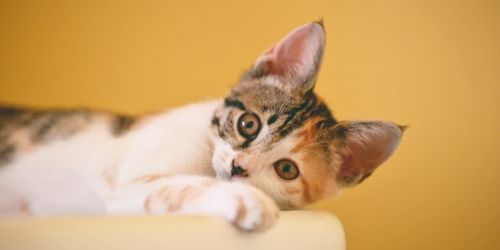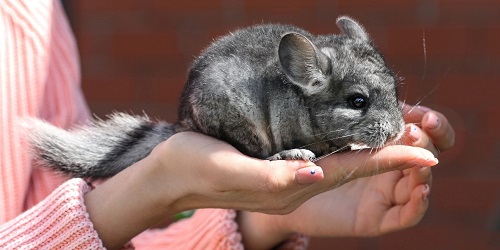Some of the links on our website are affiliate. By making a purchace via our links, you help us create new content and support animal shelters and funds
Goat's Lifespan

Goats are adorable, mischievous farm animals and make for unique pets, but how long can you enjoy their charms before they sadly get old and die?
Goats are very hardy and have an average lifespan of 7–12 years, although some specimens can live to be as old as 18. The oldest goat ever lived to the ripe old age of 22 (we bet you’re curious to know how much that is in human years)!
Goat lifespan and breed
A number of different factors can affect how long a goat will live. One of those factors is the goat’s breed. Different breeds have different lifespans.
The following are some of the longest-living goat breeds.
- Boer goats are some of the longest-living goats due to their hardy nature. These goats can withstand many diseases and have a life expectancy of 12–20 years.
- Nubian goats are some of the most popular goats in petting zoos and on farms. They are known for their extremely loud vocalizations, which might be a secret to the breed’s longevity. Some Nubian goats can live as long as 18 years.
- Finally, the famous fainting goats, formally known as Myotonic goats, can live as long as 15 years, putting them among the longest-living goat breeds.
Other goat breeds have much shorter life spans.
- La Mancha goats have some of the shortest life expectancies. These dairy goats live 7–10 years, which is the age at which dairy goats tend to lose functionality anyway.
- Angora goats also have shorter lifespans, around 10 years, although some specimens live well into their teens. These breeds are usually raised for their unique fur.
Keep these different life spans in mind when getting goats because different breeds require different levels of commitment.
Goat life expectancy and other factors
Besides the breed, a few other factors will affect how long goats can live.
- Habitat. Goats have a reputation for being fierce creatures, but remember that they are still prey animals, and their habitats need to be very carefully calibrated to help them feel protected. Goats need a habitat with plenty of shelter from the weather, including extreme heat. Make sure your goats have access to shade. Goats also need lots of mental stimulation; otherwise, they turn to self-destructive behaviors when bored.
- Stress. As mentioned above, goats are prey animals, which means they become easily stressed, which can affect their lifespan. For example, a goat whose habitat is near a natural predator—which includes dogs—will feel stressed even if there is a fence between them. Goats also get stressed if they are understimulated or live alone since they are, by nature, herd animals. Excessive stress can have negative results on their health.
- Diet. One of the most important factors in goat longevity is diet. Goats have very sensitive stomachs despite their impulses to eat everything and are prone to digestive problems, especially bacteria that they get from grazing unclean pastures.
- Obesity. One surprising factor affecting goat life expectancy these days is obesity. Today, more and more goats are kept as pets instead of as livestock animals. People dote on their pets and are prone to feeding them different treats. Unfortunately, this results in the goats becoming obese, which leads to a whole host of health problems that shorten the poor animal’s lifespan. Pet owners who want to care for their goats properly should stick to goat-appropriate foods.
An important factor affecting goat longevity is sex, especially among farm animals who are used for breeding.
Surprisingly, does live longer than bucks. People expect females to have shorter life expectancies due to the stress of pregnancy, but the stress of repeated mating shortens the life expectancy of goat males. The longest-living goat ever was a female.
Although female goats, in general, have longer life expectancies, wethers, which are male goats that have been castrated, tend to live the longest. They don’t participate in breeding at all, so there is little stress on their bodies, and many live well into their teens.
Among pet goats, sex doesn’t matter as much when determining life expectancy because these animals don’t have to breed.
Health issues shortening goat life expectancy
Like many animals, goats are prone to certain health conditions that can shorten their life expectancy and cause complications in their old age.
- One of the most common health problems affecting goats is heat stroke
Goats are by nature tropical and desert animals, and, in the wild, they survive all sorts of conditions, but even they have their upper limits when it comes to tolerating heat.
When goats are regularly in temperatures over 100 degrees Fahrenheit, it affects their bodies as their systems focus only on what’s essential. While this will not immediately cause your goat to keel over and die, repeated exposure to heat will cause unnecessary stress on their bodies. It will also decrease production, which is important for farm animals.
- A common, deadlier source of shortened goat life spans is the digestive system
Goats have sensitive digestive systems despite their reputation as omnivores and are prone to conditions such as bloat, enterotoxaemia, and even goat polio. These highly dangerous conditions can kill within hours, which is why it is important for goats to eat a balanced diet, including plenty of minerals.
The deadliest digestive issue goats encounter is the digestive parasite. Goats that go out to pasture sometimes ingest worms and parasites which come into the grass from their excrement. Parasites are actually the number one killers of goats and happen most often with farmers who don’t give their goats enough space to graze or put their goats in the same space every day.
- Finally, health problems that arise from breeding are one of the most common problems shortening goat life spans
Female goats, or does, are prone to complications from pregnancy and birth, such as mastitis, toxemia, and even arthritis. The stress of repeated breeding and birthing animals shortens the lifespans not only of does but also of bucks.
You may wonder what’s so stressful about breeding for bucks. But bucks go into rut in the fall, which is a state of single-minded focus on breeding. The animal will lose sleep, eat less, fight with other bucks, and sometimes impregnate several goats a day. This process causes enormous stress and will shorten the animal’s lifespan.
How to extend a goat’s lifespan?
Most goats live anywhere from 7 to 12 years, although some goats can live for as long as 18 years, depending on breed and care conditions. Female goats live longer than bucks, and all goats live longer when they have the right care.
Here are some tips for extending a goat’s lifespan.
- Feed your goats a proper diet. Goats need hay, goat feed, and goat minerals to supplement nutritional loss. Bucks, does, and pregnant or nursing animals have different nutritional needs, so double-check with an expert or veterinarian. Be careful never to feed your goat too much because obesity is a common health problem among goats.
- The way you arrange your goat’s habitat will also impact its lifespan. Make sure your goats have plenty of space, shade, and mental stimulation. Clean their habitat frequently and rotate their pastures to prevent parasites and infections. Goats are herd animals, so never have just one goat.


